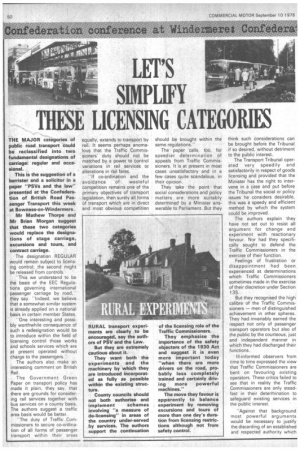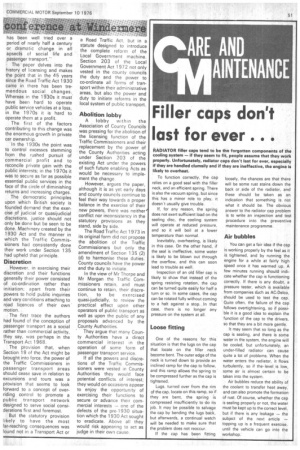LET'S SIMPLIFY THESE LICENSING CATEGORIES
Page 52

Page 53

If you've noticed an error in this article please click here to report it so we can fix it.
THE MAJOR categories of public road transport could be reclassified into two fundamental designations of carriage: regular and occasional.
This is the suggestion of a barrister and a solicitor in a paper "PSVs and the law" presented at the Confederation of British Road Passenger Transport this week at Bovvness-on-Windermere.
Mr Mathew Thorpe and Mr Brian Morgan suggest that these two categories would replace the designations of stage carriage, excursions and tours, and contract carriage.
The designation REGULAR would remain subject to licensing control; the second might be released from controls.
"This we understand to be the basis of the EEC Regulations governing international passenger carriage by road,they say. -Indeed, we believe that a somewhat similar system is already applied on a national basis in certain member States.
"One interesting and possibly worthwhile consequence of such a redesignation would be to introduce within the field of licensing control those works and schools services which are at present operated without charge to the passengers."
The authors also make an interesting comment on British Rail.
The Government Green Paper on transport policy has made it plain, they say, that there are grounds for considering rail services together with bus services on a county basis. The authors suggest a traffic area basis would be better.
"The duty of Traffic Commissioners to secure co-ordination of all forms of passenger transport within their areas equally, extends to transport by rail. It seems perhaps anomalous that the Traffic Commissioners' duty should not be matched by a power to control variations in rail services or alterations in rail fares.
"If co-ordination and the avoidance of wasteful competition remains one of the primary objectives of transport legislation, then surely all forms of transport which are in direct and most obvious competition
should be brought within the same regulations.
The paper calls, too, for speedier determination of appeals from Traffic Commissioners. It is at present in most cases unsatisfactory and in a few cases quite scandalous, in their opioion.
They take the point that social considerations and policy matters are more suitably determined by a Minister answerable to Parliament. But they
think such considerations can be brought before the Tribunal. if so desired, without detriment to the public interest.
The Transport Tribunal operated very speedily and satisfactorily in respect of goods licensing and provided that the Minister has the right to intervene in a case and put before the Tribunal the social or policy issues he considers desirable, this was a speedy and efficient method by which the system could be improved.
The authors explain they have not set out to resist all argument for change and experiment with reactionary fervour. Nor had they specifically sought to defend the Traffic Commissioners in the exercise of their function.
Feelings of frustration or disappointment had been experienced at determinations which Traffic Commissioners sometimes made in the exercise of their discretion under Section 135.
But they recognised the high calibre of the Traffic Commissioners — men of distinguished achievement in other spheres. They had invariably earned the respect not only of passenger transport operators but also of the public by the courteous, just and independent manner in which they had discharged their functions.
III-informed observers from time to time expressed the view that Traffic Commissioners are bent on favouring existing operators. These critics failed to see that in reality the Traffic Commissioners are only steadfast in their determination to safeguard existing services in the public interest.
-Against that background most powerful arguments would be necessary to justify the discarding of an established and respected authority which has been well tried over a period of nearly half a century or dramatic change in all alpsects of social life and passenger transport.''
The paper delves into the history of licensing and makes the point that in the 45 years since the Road Traffic Act 1930 came in there has been tremendous social changes._ Whereas in the 1930s it must have been hard to operate public service vehicles at a loss, in the 1970s it is hard to operate them at a profit.
The first of the factors contributing to this change was the enormous growth in private car ownership.
In the 1930s the point was to control excesses stemming from the rushed pursuit of commercial profit and to reconcile private gain with the public interests; in the 1970s it was to secure as far as possible essential public services in the face of the circle of diminishing returns and increasing charges.
The democratic principles upon which British society is founded demand that the exercise of judicial or quasijudicial discretions, justice should not only be done but be seen to be done. Machinery created by the 1930 Act and the manner in which the Traffic Commissioners had consistently done their work under Section 135 had upheld that principle.
Discretion
However, in exercising their discretion and their functions generally their power consisted of co-ordination rather than initiation; apart from their powers to hold public inquiries and vary conditions attaching to road licences of their own motion.
The first trace the authors had found of the conception of passenger transport as a social rather than commercial activity, they say, was perhaps in the Transport Act 1968.
The provision that, when Section 19 of the Act might be brought into force, the power of the Traffic Commissioners in passenger transport areas should cease save in relation to excursions and tours was a provision that seems to look forward to a concept of overriding control to promote a public transport network designed to serve social considerations first and foremost.
. But the statutory provision likely to have the most far-reaching consequences was found not in a Transport Act or a Road Traffic Act, but in a statute designed to introduce the complete reform of the Local Government machine. Section 203 of the Local Government Act 1972 not only vested in the county councils the duty and the power to co-ordinate all forms of transport within their administrative areas, but also the power and duty to initiate reforms in the local system of public transport.
Abolition lobby
A lobby within the Association of County Councils was pressing for the abolition of the licensing function of the Traffic Commissioners and their replacement by the power of the County Authorities acting under Section 203 of the existing Act under the powers of such future enabling Acts as would be necessary to implement the change.
However, argues the paper, although it is as yet early days and county councils continue to feel their way towards a proper balance in the exercise of their new powers, there was neither' conflict nor inconsistency in the statutory provisions as they stand, side by side.
The Road Traffic Act 1973 in its original form did not propose the abolition of the Traffic Commissioners but only the amendment of Section 135 (2) (d) to harmonise these duties. County councils have the power and the duty to initiate.
In the view of Mr Thorpe and Mr Morgan the Traffic Commissioners retain. and must continue to retain, their discre tion, to be exercised quasi-judicially, to review the practical effect upon other operators of public transport as well as upon the public of any proposals advanced by the County Authorities.
They argue that many County Authorities have a direct commercial interest in the operation of some form of passenger transport service.
If all the powers and discretions of the Traffic Commissioners were vested in County Authorities they would face potential conflicts of interest; they would on occasions appear to enjoy the opportunity of exercising their functions to secure or advance their commercial interests — one of the defects of the pre-1930 situation which the 1930 Act sought to eradicate. Above all they would risk appearing to act as judge in their own cause.




























































































